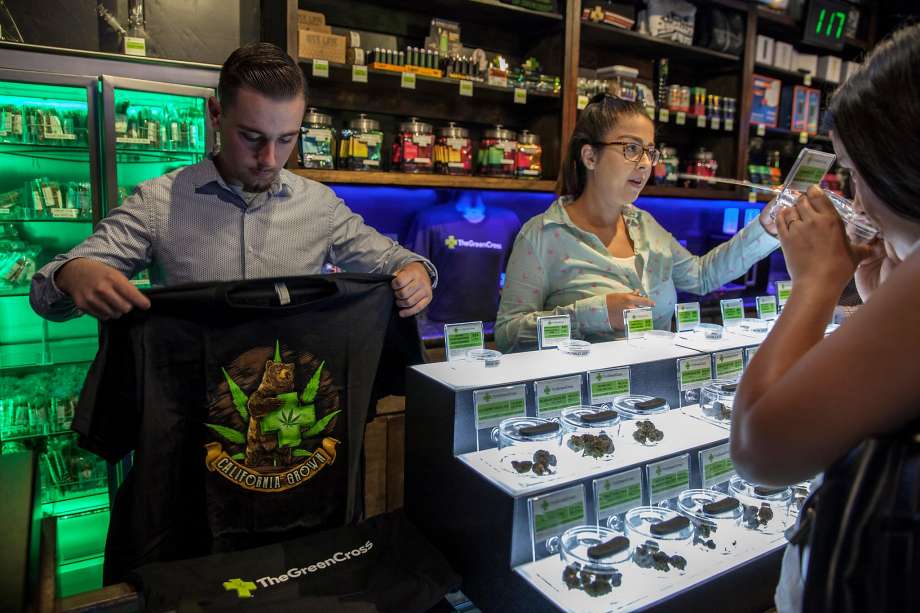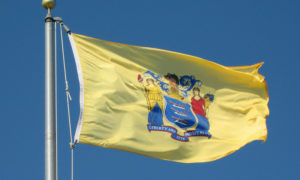
Photo: Peter DaSilva, Special To The Chronicle
At the online store Cafepress.com, you can buy a shirt emblazoned with an American flag and bearing the words: “The United States of Amerijuana … with Brownies and Doobies For All.”
Allen said he’s sympathetic to small businesses, but that his bill isn’t directed at them. Instead, he said, it’s focused on “Big Cannabis” — larger corporate entities expected to enter the legalized marijuana business. With the onset of recreational-use sales next year, Allen said, he anticipates such manufacturers and retailers may introduce marketing schemes that could appeal to children, such as a mascot like Joe Camel, a cartoon character that for years served as the mascot for Camel cigarettes.
Proposition 64, the ballot measure that legalized adult use of cannabis last November, contained rules about cannabis advertising, including banning the use of cartoon characters and other imagery directed at young people. Allen said Prop. 64’s restriction are not enough.
“We need to do this now, before Big Weed gets a lot of power,” he said.
At the moment, “We all have a quaint image of a little pot farmer up in Humboldt working all by himself,” Allen said. “The fact is that tobacco in the beginning was a quaint little product in Jamestown,” the early colonial settlement in Virginia.
If it were to pass, Allen’s bill could be the most restrictive in the country. Colorado limits advertising in venues such as websites and TV shows that are likely to be seen by children (just as Prop. 64 does), but makes no mention of promotional materials. The state of Washington restricts branded merchandise with a set of complicated rules that allows companies to distribute such goods as long as it’s done by a separate entity.
Joe Camel and other imagery designed to appeal to young people were banned in 1998 as part of the Tobacco Master Settlement Agreement, an agreement between the major U.S. tobacco companies and 46 states that restricted tobacco advertising, singling out marketing to children in particular. Such restrictions could conceivably apply to California cannabis companies, while still allowing them to promote themselves on branded merchandise.

Green Cross cannabis dispensary wouldn’t be able to sell merchandise with the shop’s logo if a state bill to limit pot promotion with branded goods passes. Photo: Peter DaSilva, Special To The Chronicle
Despite the general success of the tobacco settlement agreement, Dr. Jacques Corriveau insists that a more expansive blanket ban is necessary in the case of cannabis, arguing, “it’s hard to distinguish what’s aimed at kids and what isn’t.”
Corriveau is chairman of the state government affairs committee of the American Academy of Pediatrics, California, which opposed Prop. 64. The California Police Chiefs Association, which also opposed Prop. 64, also supports Allen’s bill.
Allen himself publicly supported Prop. 64 but says cannabis, like tobacco, is “not a necessary product,” and therefore banning certain types of advertising for it passes legal muster.
Tim Andrews, president and CEO of the Advertising Specialty Institute, says the legislation would, contrary to Allen’s theory, actually help “Big Weed” gain market power.
Allowing small companies to distribute such materials, Andrews says, would be “a great way to ensure that big entities are less able to come in and do that.” For small operators, branded merchandise is “the best” form of advertising, he said, and “would help those small businesses protect themselves from Big Cannabis.”
The State Assembly’s Appropriations Committee will take up Allen’s bill when lawmakers return from summer recess Aug. 21. In the meantime, Allen says he’s open to negotiations on its content.
The California Cannabis Industry Association, a leading pot lobby, did not respond to requests for comment. The California Growers Association is officially neutral on the bill. But that group’s executive director, Hezekiah Allen, says he’s working with legislators to make it more palatable to the growers association’s members.
“We think it’s well-intentioned,” he said. But as it stands, “It’s definitely a concern for our members.”
Link – SF Chronicle




































